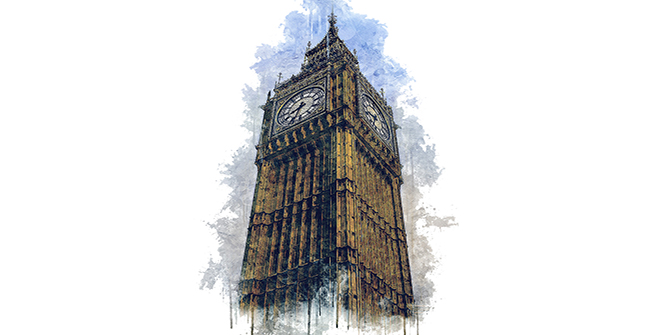Politics in Britain today seems bereft of ideas. Both the Conservative and Labour parties seem to believe that politics is about technocratic pragmatism, “doing what works”. But effective policymaking has always been grounded in big ideas from the parties’ intellectual traditions, argues Andrew O’Brien.
“What should we do?” It is the most basic question in politics. Most of the attention these days is given to the second part of that question – the doing. Policy announcements, votes and U-turns are the common currency of politics and the media’s reporting of it. But the first part of the question, the one asking what should be done is even more important. Behind all political and policy debate is a battle about what constitutes a good society. The best politicians and policy makers recognise this normative element of politics. The worst assume that the battle has been won or that there really is no battle. It’s all a matter of being pragmatic, having the right technocrats, and being willing to put in the work. Both the Conservatives and Labour are guilty of this sin.
In his excellent book Remaking One Nation, Nick Timothy, formerly Chief of Staff to Theresa May and now Conservative Prospective Parliamentary Candidate for West Suffolk, summed up the problem with modern politics well:
“Few things matter more than political ideas. They have the power to change – for better or for worse – the fates of individuals, families and nations. Yet it is striking how little political ideas are really debated and discussed…But many politicians – and almost all civil servants and technocratic experts called upon to shape policy – deny any kind of ideology. They say they believe in ‘what works’. This is a nice line, but it is untrue.”
Ideologies, intellectual traditions, philosophy, whatever you want to call it, these things shape the fates of nations because they are the foundational source of policy making.
Ideologies, intellectual traditions, philosophy, whatever you want to call it, these things shape the fates of nations because they are the foundational source of policy making. To use the modern jargon, if you don’t know what good looks like, it is very hard to develop ideas for how to get there.
Intellectual traditions can play a number of important roles for policy makers.
Firstly, they offer a heuristic device. The challenge in politics is that answering the “should” question requires the manufacturing of consent across a broad group of people, across a relatively long period of time. Intellectual traditions enable a diverse group of people to rally around particular solutions or missions, knowing that these ideas are worthy of endorsement because they draw upon a canon or thinkers that are respected by the wider group. What would Attlee do today? We cannot know for certain. However, if you can make the case that Attlee would do X, it makes it easier to get the consent of people that think he represented a positive force in politics. Successful parties have usually had more than just one successful leader or thinker. This is an important fact that is often ignored by those in the frontline of politics who tend to suffer from recency bias.
Secondly, intellectual traditions provide a source of inspiration. They are a mine from which the raw materials of politics can be drawn – narratives and visions for the future, arguments about what is right and wrong, proposals and ideas for how to deliver their aspirations. How did we come up with the National Health Service? Most people will come back to Beveridge or Bevan, but what inspired them? The British idealism of T.H. Green, who articulated the need for the state to intervene to create the conditions for people to make free choices according to their own conscience, was a source of inspiration for Beveridge. The ethical socialism of John Ruskin and William Morris which demanded dignity and care for all working people can be heard in the speeches of Attlee and Bevan. Transformative policy ideas are the intellectual labour of many actors, some of whom may never even have realised the potential of their own ideas. Abby Innes’s brilliant book Late Soviet Britain shows, on the negative side, how the influence of neoclassical economics drove a whole set of policy ideas that have created problems that we are now grappling with today.
Politicians and policy makers that are cut off from their intellectual traditions may end up pursuing policies which actively undermine what they later discover to be their driving purpose in politics.
Finally, intellectual traditions are a source of strategy. Politicians and policy makers that are cut off from their intellectual traditions may end up pursuing policies which actively undermine what they later discover to be their driving purpose in politics. Many Conservatives would argue that this has happened to the Conservative Party in recent years which has ended up pursuing a set of liberal economic and social policies, which in turn have undermined the party’s own foundational beliefs in the importance of home, place and the nation. Danny Kruger’s recent book Covenant is an example of these arguments. A dependence on only one recent set of ideas, neoliberalism, has left the Conservatives with a sterile debate where the policy answer to every problem appears to be “cut taxes”. This was recently highlighted by the “debate” around the Budget where the core policy dilemma was only whether to cut National Insurance or Income Tax.
Labour is not immune to this, however. Jon Cruddas, in his newly published book A Century of Labour, quotes R.H Tawney’s The Choice before the Labour Party from 1934, echoing some of the problems the party faces today. Tawney was describing Labour’s policy paralysis in response to the Great Depression.
“The gravest weakness of British Labour is…its lack of creed. The Labour Party is hesitant in action, because divided in mind. It does not achieve what it could, because it does not know what it wants.”
Cruddas’ point is that Labour today is in danger of being stuck in a similar position it was in the 1930s. This is not for a lack of options. Having existed formally for over a century, Labour has a huge variety of ideas to choose from. In reading recently Peter Mandelson and Roger Liddle’s pre-1997 election book The Blair Revolution: Can New Labour deliver? it is striking how New Labour sought to draw on a broad intellectual traditions such as One Nation conservatism, ethical socialism, Rawls, communitarianism and many more besides. Domestically, this created a very broad set of policy ideas providing the basis of everything from ASBOs to the Equalities Act. Was the intellectual base of New Labour too broad and create too many tensions? Possibly. However, a comprehensive policy platform requires a political philosophy (or combinations of philosophies) deep enough to provide a diverse set of ideas that can then lead to a coherent set of policies.
In a recent paper for Demos, Lost Ideals: Conservatives in the New Age of Inheritance, I draw on the party’s intellectual traditions to show how debates about inheritance tax have always been contested. I hope this paper shows that the idea that the only ‘truly conservative’ policy on inheritance tax is to abolish it is wrong. Drawing on a broader set of ideas from Burke and Disraeli to Macmillan and Lord Halisham, I found insights that presented alternatives to the current debate and new potential policy avenues. In discussing this paper with policy colleagues, I was shocked at how few Conservatives understood or even knew of these thinkers. Understanding their arguments and insights gave new confidence to some that they could make conservative arguments for reforming inheritance tax. It is a small example, but I hope it is an insightful one.
The challenge for policy makers is to break out not just of the geographical bubble of Westminster but the intellectual and temporal one.
The good news is that writing and scholarship on these subjects has never been stronger, opening up new sources of inspiration and critique. The challenge for policy makers is to break out not just of the geographical bubble of Westminster but the intellectual and temporal one. The overall message for policy makers today is you are not alone. There are generations of great minds and ideas to draw upon from mid-20th Century Conservatives such as Lord Halisham and T.E. Utley to early 20th Century Labour intellectuals such as Tawney and G.D.H. Cole. Recovering our intellectual past will help us to navigate a difficult future and, in the process, inspire new ideas to meet these challenges.
All articles posted on this blog give the views of the author(s), and not the position of LSE British Politics and Policy, nor of the London School of Economics and Political Science.
Image credit: chrisdorney on Shutterstock







